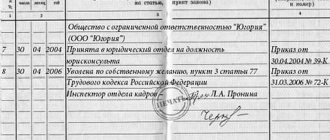Introduction
- The concept of liability
- Material liability of the employee
- Types of employee liability
- Employer's liability
- Types of employer liability
List of used literature
Introduction
The concept of financial responsibility is most clearly manifested in the sphere of labor relations, since the basis of any society is the labor activity of people. Labor is a condition of human existence independent of any social forms and constitutes its eternal natural necessity.
The need for legal regulation of labor organization is determined by the needs of social production and the entire course of its historical development. Regulatory regulation is the most effective and technical way of organizing numerous and varied social relations, ensuring their stability and implementation, and overcoming arbitrariness in relations between people. The purpose of law is also to ensure, by regulating the measure of labor and the measure of remuneration for labor, a fair distribution among members of society of both the work itself and its results.
The main sectoral source of labor law is currently the Labor Code, adopted on December 30, 2001. The dynamism of labor law is determined not only by economic factors, but also by technological, organizational and social changes in the world of work, which are currently global in nature. These changes caused the emergence of new types of labor and new forms of its organization, new types of employment and social and labor relations.
The subjects of the labor relationship are in an unequal position in relation to each other. The employee is the economically weaker party in the employment relationship. He is in a more dependent position on the employer than the employer is on him. The employee is obliged to submit to the employer's authority, follow his instructions in the course of his work, and strive to ensure the safety of the property entrusted in connection with the performance of his work duties. In turn, the employer is obliged not only to properly organize the labor process, but also to take measures to prevent the occurrence of property damage.
The inequality of the subjects of the labor relationship causes significant differences in the legal regulation of the material liability of the employer to the employee and the employee to the employer, which relate to determining the amount of damages to be compensated, the procedure and limits of compensation, and the nature of the legal norms regulating financial liability.
The concept of liability
In accordance with the Constitution of the Russian Federation, labor protection and health of people (Article 7), recognition and protection equally of private, state, municipal and other forms of property (the article refers to the foundations of the constitutional system. According to Article 37 of the Constitution of the Russian Federation, the most important rights and freedoms of man and citizen are the right of everyone to freely dispose of their ability to work, to choose their type of activity and profession, as well as the right of everyone to work in conditions that meet safety and hygiene requirements, and to protection from unemployment.
refers to the foundations of the constitutional system. According to Article 37 of the Constitution of the Russian Federation, the most important rights and freedoms of man and citizen are the right of everyone to freely dispose of their ability to work, to choose their type of activity and profession, as well as the right of everyone to work in conditions that meet safety and hygiene requirements, and to protection from unemployment.
In relation to the parties to the employment contract (employee and employer), the above constitutional provisions are developed in acts of labor legislation. Thus, every employee has the right to fair working conditions that meet safety and hygiene requirements, and to compensation for damage caused to the employee in connection with the performance of his job duties; in turn, one of the main responsibilities of an employee is to take care of the employer’s property. If, as a result of improper performance by an employee or employer of their duties, material damage is caused to the other party to the employment agreement (contract), then it is subject to compensation.
Compensation for damage is an obligation that arises from one of the parties to an employment contract in relation to the other party.
The basis for imposing material liability on a party to an employment contract is the unlawful and culpable infliction of damage by it on the other party to this contract, unless otherwise provided by law.
Thus, the financial liability of the parties to an employment contract consists of the obligation of one of its parties to compensate, in accordance with the law, for material damage caused by it to the other party to this contract.
Depending on who caused harm to whom, it differs: the employee’s financial liability for damage caused to production by his guilty actions or inaction, and the employer’s financial liability for harm caused to the employee by a work-related injury or other damage to health, as well as a violation of his right to work.
Recognizing the legal equality of the parties to an employment contract, the legislation takes into account that the employer:
1) economically is always stronger than an individual worker;
2) organizes the labor process and bears responsibility in connection with this
liability for any adverse consequences that may arise;
3) as the owner of the property, he bears the burden of its maintenance and the risk of accidental death or accidental damage. On the other hand, legislation proceeds from the fact that the main value of a person is his physical and mental ability to work, which he can realize in various legal forms, but primarily by concluding an employment contract.
This predetermines the differences between the two types of responsibility. An employment contract may specify the financial responsibility of the parties to this contract. At the same time, the contractual liability of the employer to the employee cannot be lower, and the employee to the employer – higher, than provided for by the Labor Code of the Russian Federation or other federal laws.
We can identify some general features that characterize the financial responsibility of the parties to an employment contract - the employer and the employee:
1) The emergence of bilateral financial liability due to the existence of an employment contract;
2) Only the parties to the contract are the subjects of material liability;
3) Liability arises in the event of violation of obligations under
employment contract;
4) Each party is liable only for culpable breaches of duty if this caused damage to the other party;
5) Possibility of compensation for damage on a voluntary basis.
The grounds on which financial liability arises are listed in Art. 233 Labor Code of the Russian Federation:
a) the presence of property damage to the injured party is a necessary condition for financial liability.
b) illegality of behavior (action or inaction) or violation of the obligations assigned to the party to the employment contract by the relevant legal norms (LC Articles 21,22).
c) guilt is possible in the form of intent, which is extremely rare in labor relations, and through negligence.
d) causal connection means that the damage did not occur by chance and was a consequence of specific actions of one or the other party to the employment contract, which must be confirmed by evidence.
The legislation provides for two types of liability:
1) the employee’s financial liability to the employer;
2) the financial liability of the employer to the employee.
Which employees are excluded from the list of those subject to full liability?
All people whose occupation is not included in the list of the Ministry of Labor are excluded from this list. (Resolution No. 85 of December 31, 2002) They can be attracted only in cases specifically provided for by law. For example, intentional actions, crimes, etc.
It is impossible to involve persons under 18 years of age in it unless they have committed an unlawful or criminal act.
The employee’s full individual MO does not arise when there are extraordinary circumstances, force majeure, a threat to life, production risks, if the employee is not at fault, or the employer has not provided the proper conditions for storing and processing valuables.
The employee is exempt from it even if he reported unsatisfactory processing and storage conditions, but no measures were taken by management
Material liability of the employee
An enterprise can suffer losses not only because its partners failed or because market conditions changed. Sometimes unforeseen costs arise due to the fault of employees, due to their conscious desire to cause harm or simply a negligent attitude towards fulfilling their official duties. It is for this reason that equipment may fail, and materials may deteriorate and lose qualities, without which they cannot be used for production.
The company can cover the resulting losses at its own expense. However, the organization has the right to demand that these expenses be compensated by the employee, who is financially responsible for the safety of the property.
One of the important means of protecting various forms of ownership is the employee’s financial liability for damage caused to the enterprise in the performance of work duties. The employee’s financial liability consists of his obligation to compensate for damage caused to the employer. The most important rules of this responsibility are enshrined in Art. Art. 232, 233, 238-250 Labor Code of the Russian Federation. This legislation, establishing the employee’s obligation to compensate for damage caused to the employer, also provides guarantees for maintaining the employee’s wages. At the same time, it obliges the employer to create for the employee the conditions necessary to ensure the complete safety of the property entrusted to him and regulates certain organizational relations.
The employee compensates for damage depending on what kind of contract was concluded when hiring the employee (labor or civil law).
Relations under an employment contract are regulated by the Labor Code of the Russian Federation. In particular, Chapter 39 of the Labor Code of the Russian Federation is devoted to the material liability of an employee. How, according to Article 238 of the Labor Code of the Russian Federation, the employee must compensate the employer for the so-called direct actual damage, that is, damage from the loss of property or its damage, as well as additional costs for its restoration or the purchase of a new one. For example, direct actual damage may include shortages and damage to materials and other valuables, costs of repairing damaged property, sanctions imposed on the employer, etc.
In accordance with Article 22 of the Labor Code of the Russian Federation, the employer has the right to hold the employee financially liable, but is not obligated to do so. Therefore, taking into account all the accompanying circumstances, the organization may not fully or partially recover damages from the guilty employee (Article 240 of the Labor Code of the Russian Federation).
In addition, Article 239 of the Labor Code of the Russian Federation provides a list of cases when an employee does not bear financial responsibility at all. For example, if the damage was caused by emergency circumstances (storm, flood, drought, etc.).
As for persons who work under civil contracts, in this case one must be guided by the Civil Code of the Russian Federation. Just as in labor legislation, Article 15 of the Civil Code of the Russian Federation stipulates that the employee is obliged to compensate for damage to the organization in cases where direct actual damage is caused. In the Civil Code of the Russian Federation it is called real.
But in addition to this, the organization may require to cover those losses that are associated with lost profits, that is, with those incomes that the organization was unable to receive due to the erroneous actions of a person working under a civil contract.
In order to determine the amount of damage, you first need to determine the amount of damage that the company has suffered. How to do this is stated in Article 246 of the Labor Code of the Russian Federation. Damage includes actual losses of the organization. The amount of damage is determined by a special commission. It is created by order of the head of the organization. It is the commission that determines the reason for the damage, and therefore how guilty the employee is of it.
Concept and types
Full MO is an obligation imposed on a person to compensate for the harm caused by him, if the damage arose through his fault. Moreover, the refund is made in full. Compensation is not dependent on earnings. But only assessed direct damage is compensated.
The Labor Code considers the following types of liability:
- Individual. (It's personal)
- Collective.
- Limited. (Partial).
- Full.
Let's talk about the last two, but let's start with the limited one. This means partial compensation for losses. The culprit pays only part of the amount of damage. Usually no more than a month's salary. The employer himself can withhold compensation from the culprit; however, he has the right to refuse to compensate for losses. If the culprit refuses, then a trial follows.
Individual . This MO is applied to a specific person whose guilt in causing harm has been proven.
Collective is the MO of employees, for example, teams that deal with material assets. Stored, transported, etc.
The presence of such MO does not exclude individual one. Each official, in addition to the general (collective) agreement, has the right to conclude a separate agreement.
Collective MO can arise only when an appropriate agreement is concluded with the collective. The appearance of new employees does not cancel the contract. Only updating the roster by more than 50% requires its re-signing.
Standard form for full individual financial responsibility - sample.
3.Types of employee liability
After establishing the cause of the damage and determining how guilty the employee is, the head of the organization, based on the conclusion of the commission, decides whether or not to withhold the amount of damage from the employee. If so, to what extent can he do this? The answer to this question depends on what financial responsibility is assigned to the employee. The Labor Code of the Russian Federation provides for full and limited liability.
In case of full financial liability, the employee is obliged to compensate the damage in full. An employee bears full financial responsibility in accordance with Article 243 of the Labor Code of the Russian Federation if he caused damage to:
- allowing a shortage of valuables received on account on the basis of a special written agreement or under a one-time document (for example, according to a demand invoice);
— intentionally or under the influence of alcohol, drugs or toxic substances;
- because of their criminal actions or administrative offense (if this is established by the court);
— by disclosing information constituting an official or commercial secret (in cases provided for by federal laws);
- failing to fulfill your job duties.
Most often, the full financial responsibility of the employee is fixed in a corresponding written agreement. An agreement on full financial liability can be concluded with certain categories of workers or persons performing certain work.
Intentional causing of damage to the employer's property by an employee entails full financial liability (Clause 3, Part 1, Article 243). An offense is considered committed intentionally if the person who committed it was aware of the illegal nature of his action (inaction), foresaw its harmful consequences and desired the occurrence of such consequences or consciously allowed or was indifferent to them.
In accordance with clause 7, part 1, art. 243 of the Labor Code of the Russian Federation, the basis for full financial liability may be the disclosure of information constituting a legally protected secret (official, commercial or other) in cases provided for by federal laws.
Information constitutes an official or commercial secret when it has actual or potential commercial value due to its unknownness to third parties, there is no free access to it on a legal basis and the owner of the information takes measures to protect its confidentiality. In such cases, employees bear financial responsibility according to labor legislation.
The list of confidential information was approved by Decree of the President of the Russian Federation of March 6, 1997 No. 188. This list also includes information that constitutes a trade secret. This is information related to commercial activities, access to which is limited.
The obligation to keep secrets in certain areas of activity is provided for in a number of federal laws on this activity. To hold employees financially liable for disclosing the above information, at least two conditions must be met:
1) the existence of the employee’s obligation to maintain the relevant secret included in his employment contract;
2) the existence of a federal law providing for financial liability in such a case.
The obligation not to disclose state, official, commercial and other secrets protected by law may be included in employment contracts only for employees who may know it due to their job duties.
Article 248 of the Labor Code provides for two different procedures for collecting damages from the guilty employee:
1) in cases where the employee bears financial liability limited to his average monthly earnings;
2) in cases where the amount of damage caused to be recovered from the employee exceeds his average monthly earnings.
If we are talking about limited financial liability, then in order to recover damages, an order from the head of the organization is sufficient. Moreover, in accordance with the Labor Code of the Russian Federation, the employer is not obliged to ask the employee whether he agrees to voluntarily pay off the damage or not. The amount of average monthly earnings will simply be withheld from his salary. However, the employee can protest such actions of the employer in court.
The manager must give an order to recover damages no later than one month from the day on which its amount was finally established. Otherwise, the employer will not be able to withhold the required amount from him without the employee’s consent. And in case of refusal, he will have to demand coverage of losses through the court.
It will also be necessary to go to court in the case where the employee does not want to voluntarily compensate for the damage, although he signed an agreement on full financial responsibility. If an employee voluntarily compensates for the losses caused to him, then, as in the case of limited liability, in order to recover damages from him, an order from the head of the organization will be sufficient.
So, if an employee decides to voluntarily compensate for damage, then he has the right to do this in different ways. Thus, an employee, with the consent of the employer, can transfer him property of equal value or repair damaged property. In addition, he can deposit the required amount into the cash register or into the current account of the enterprise. Or the amount of damage may be deducted from his salary.
However, Article 138 of the Labor Code of the Russian Federation states that if an employee has agreed to voluntarily compensate for damage, then more than 20 percent of his earnings cannot be withheld from him. If damage is recovered through the court, then under one writ of execution it is also impossible to recover more than 20 percent of wages, and under several writs of execution more than 50. In exceptional cases, when the damage was the result of criminal actions, up to 70 percent of wages can be withheld from the employee.
Full responsibility up to 18 years of age
Such MO is not assigned to minors, except in cases of full financial liability of the employee when the harm was caused by a person under 18 years of age as a result of a crime or offense while intoxicated.
When does it occur?
Responsible for the employee when:
- A corresponding agreement has been concluded with him.
- He committed intentional acts with the intent to cause harm.
- In case of a crime or misdemeanor.
- The damage was caused while intoxicated, alcoholic, toxic or narcotic.
4.Financial liability of the employer
Among the responsibilities of one of the parties to an employer's employment contract, labor legislation names the obligation to comply with laws and other regulatory legal acts, local regulations, the terms of a collective agreement, agreements and employment contracts. Therefore, the employer’s responsibility for failure to fulfill obligations under a previously established employment relationship is a contractual liability; relations for compensation for damage (harm) by the employer in employment relationships cannot be classified as an independent type of law enforcement legal relationship, derived from labor or closely related to them. The protective function here is carried out within the framework of the existing employment relationship.
These relations should be considered as an insurance system of labor relations, designed to most fully satisfy the interests and needs of the subjects of labor relations in the process of regulating living labor. Labor legislation obliges the employer to compensate for damage resulting from the employer’s violation of the employee’s labor rights.
Responsibilities
A person who is entrusted with material assets is obliged to:
- Treat them with care.
- Control storage, acceptance, release.
- Keep records of the property entrusted to him.
- Report to management on the state of values.
- Promptly notify management of all possible risks associated with damage.
- Provide an explanation of the damage identified.
- Organize and carry out events aimed at preserving property.






